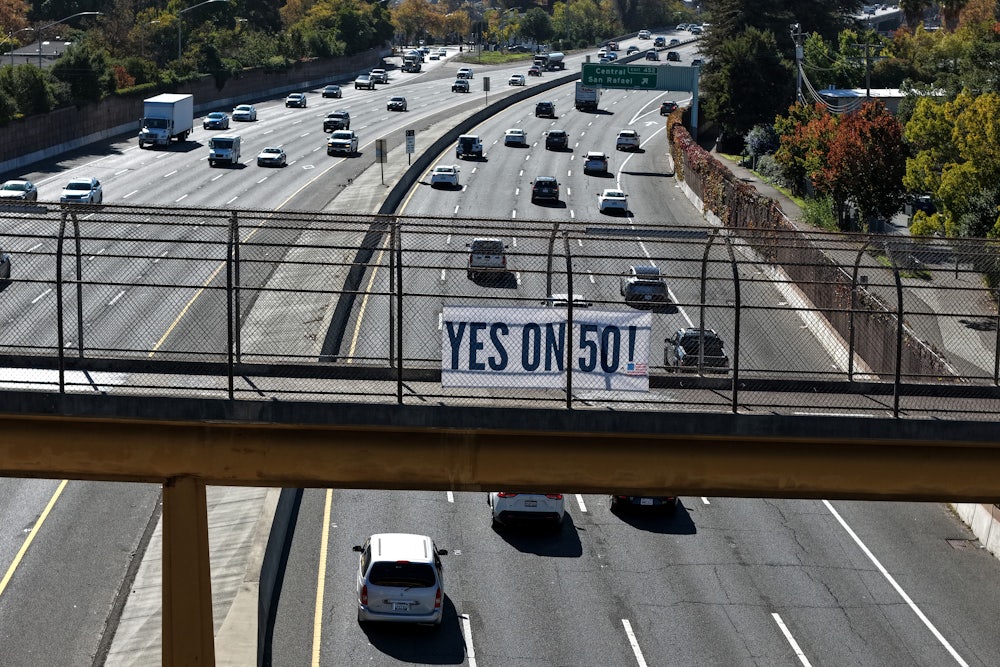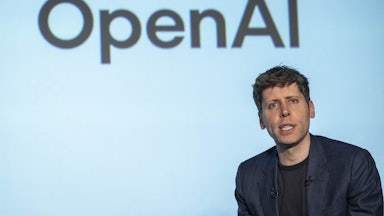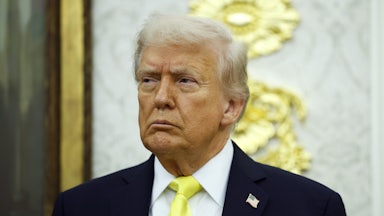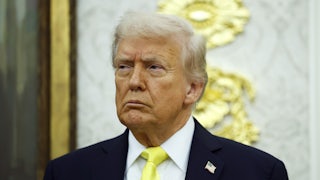Ten days before California’s special election on Proposition 50—the vote that would permit a redrawing of congressional election lines in order to add Democratic seats to the House of Representatives—the Department of Justice posted a jarring yet unsurprising press release. Using now-standard election-denial terms like “transparency” and “public confidence,” the DOJ announced it would send election monitors to five counties to “protect the votes of eligible American citizens.”
In normal times, it’s not unusual for the federal government to send in the poll watchers. Federal election monitors appeared in California as recently as 2014. But whereas prior monitors were career litigators or postal inspectors, this time the DOJ sent political appointees—most notably Assistant Attorney General Michael Gates, a longtime Orange County GOP operative who once claimed he’d heard of a dog receiving a ballot. Gates was also a signatory on the letter that Texas used as legal rationale for its own redistricting scheme (a move it made even as it said the letter was based on false evidence).
Justin Levitt, who held Gates’s job in the Obama administration, told The New Republic that during his time in office, there was “never a notion” that he would monitor polls in the same way Gates has been dispatched to do, and pointed out that Trump’s man at the DOJ may now be placing himself in the compromising position of being both witness and litigator. “The people who are monitors or observers, they’re also witnesses if there’s going to be litigation in the future,” Levitt said. “They write down what they’ve observed and they may be called on in court to testify what they’ve observed … it’s a giant mistake to have a lawyer sort of stuck in between performing as a lawyer and acting as a witness.”
After the press release, the California secretary of state sent a letter to the DOJ questioning the legality of the election monitors. A day later, the Orange County Registrar’s Office said that Gates would be permitted to observe the election process as an “authorized representative” of the DOJ.
On Election Day, I drove to the Orange County Registrar’s office in Santa Ana hoping to cross Gates’s path. Orange County is a red spot in blue Southern California, and Santa Ana is the city where in 1988 a group of uniformed guards carried signs outside polling centers warning that only citizens can vote (the Orange County Republican Party later settled a suit for $400,000). While this is his backyard, today Gates was nowhere to be found.
In Orange County, the line of voters lingered outside. It was typical of the standard polling place—busier during lunch, nurses in scrubs, mothers with a baby on their shoulder. The local CNN reporter was keeping watch. I didn’t see any dogs waiting to vote. Not long after I arrived on the scene, I heard that Gates was spotted up in Riverside County. I spent another hour giving chase, only to miss Gates again. The check-in list said that he had arrived at 9:30 a.m.
Somebody who saw Gates in Riverside told me that he appeared to take about half a page of notes and that with the rest of his time, he and another observer made small talk about cats. Nothing riveting, and Gates mostly sat around, didn’t seem to pay much attention to what was going on, and didn’t even appear to go to the section of the building where the ballots were actually being counted.
While I was at Riverside, I figured I might as well talk to voters, and it seemed about half of them voted for Proposition 50. Cecille, a nurse practitioner, told me, “I would like to fight against hopelessness and despair, so if I can do something, then great.… I think I did what I needed to do.” But Riverside is a Trump county, and there were plenty of voters on hand who seemed skeptical of the process. One such voter, Dawn, told me that there were not enough safeguards in place to her liking—“no verification of who I am,” she fretted.
Maybe that’s the sort of shenanigans that Gates was chasing, I thought. Levitt set me straight, however, telling me that there are no DOJ statutes that allow the government to exclude ballots. Gates’s notes could theoretically be used in a criminal DOJ case, but, more likely they’ll serve as the shoddy evidence for claims such as the one Trump made Tuesday afternoon that the Prop 50 vote “is rigged.”
Gates eventually messaged back only to decline to comment for this piece. Exhausted with the civic process, I drove down to East Los Angeles, where the sun was setting over stucco houses and cacti. A line of mostly Hispanic voters wrapped around a red-brick auditorium with a small American flag hanging from the door. Outside, a street vendor was selling chips and Agua Fresca—the inexplicably delicious fruit drink popular in L.A. An ice cream truck jingled its way down the block.
The line in East L.A. was much longer than those in Riverside and Orange County. Some people had waited in line for half an hour, just to vote on a single question. Belinda, one of those patient citizens, told me, “Voting is power,” and that it felt good to “see a lot of families out here” and to “see a new generation here.” She was voting with her friend Fernando, who said, “Hopefully this will make a change with everything that’s going on … because I’m almost fifty years old and I’ve never seen anything like this.”
An hour later, I stopped at a different polling place a mile or so away, this one with an even longer line. Some people here had been waiting for an hour or more to vote, snaking back and forth through a parking lot. These voters had turned out for more or less the same reasons as those I’d just left. Jennifer, an immigration paralegal who waited for 45 minutes, told me, “My voice feels important in this election.”
Finally, after hours of waiting, I struck gold: There was a dog in line. Imagine my disappointment when the dog—a 3-year-old Shitzu named Leila—stayed outside on the steps, a good 20 feet from the ballot box. Once again, my hopes of seeing a dog try to cast a vote were dashed.










